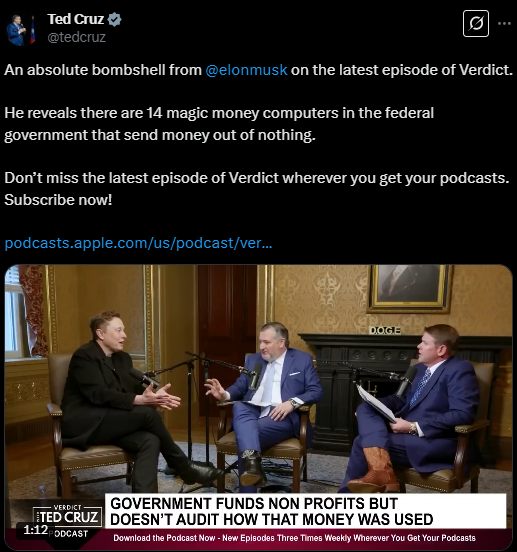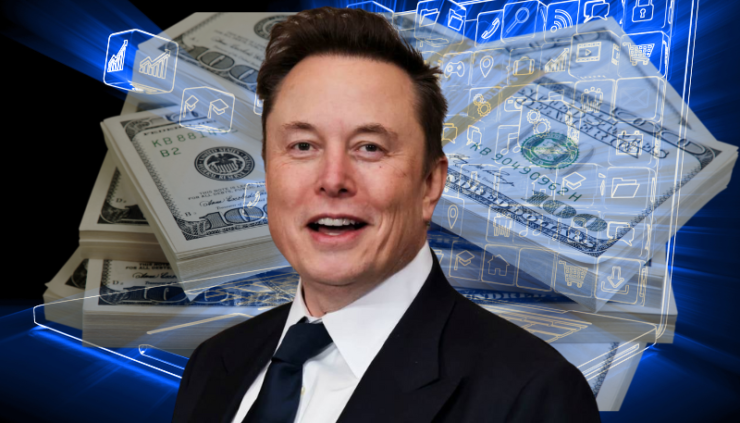In a bombshell revelation, Elon Musk, serving as the US government’s cost-cutting czar, claims to have uncovered “magic money computers” inside multiple federal agencies that effectively print money out of thin air.
Speaking on the Verdict with Ted Cruz podcast, Musk said his team identified at least 14 computers across departments like the Treasury, Defense, and Health and Human Services capable of issuing payments without clear accountability or oversight.
“You may think that the government computers are synchronized, calculating what funds are going where,” Musk said. “They’re not totally wrong, but they’re probably off by 5% or 10% in some cases. That’s why I call it a ‘magic money computer’ any computer that can make money out of thin air.”

Musk’s investigation didn’t just uncover mysterious money flows; it exposed deep flaws in government financial systems. According to Musk, some departments have more media and software subscriptions than actual employees, with credit cards often exceeding staff numbers by twofold.
In Musk’s view, the issue isn’t solely malicious fraud but a toxic mix of incompetence and neglect:
“Eighty percent of it is waste and incompetence. Money is being sent by mistake and no one bothers to get it back.”
In one case, Musk’s team flagged Treasury payments with no codes or explanations, tracing some of the money back to contracts that were supposed to be shut down—but weren’t. The result? Companies kept getting paid for services no longer rendered, with no one inside the government noticing.
“Now is that waste or fraud?” Musk asked. “It’s both.”
Bitcoin Community Reacts
The revelation triggered instant reactions from the crypto community. Jameson Lopp, chief security officer at Bitcoin custody firm Casa, commented that:
“Bitcoin fixes this.”
For Bitcoin advocates, Musk’s findings confirm a systemic flaw in fiat monetary systems—where the money supply is expandable at will, driving inflation and weakening purchasing power. Capped at 21 million coins, Bitcoin was designed as a hedge against this type of government overreach.
Musk’s revelations may reignite the debate around the need for decentralized financial systems that minimize human error, waste, and unchecked money printing.
Cost-cutting comes at a Price
Musk’s aggressive government auditing hasn’t gone unnoticed. According to reports, his DOGE (Department of Government Efficiency) initiative has triggered backlash. Tesla facilities across the US have become targets of the “Take Down Tesla” movement, protesting what critics call excessive cuts driven by Musk’s investigations.
Vandalism and protests have surged, with some accusing Musk of undermining government programs in the name of efficiency. Still, Musk remains unmoved, insisting that his mission is protecting taxpayer money and exposing broken systems.
Musk’s exposé raises urgent questions about just how broken government financial systems have become. From phantom payments to contracts running on autopilot, the findings paint a troubling picture of bureaucracy where billions could be leaking out without oversight.
For the crypto world, it’s yet another moment highlighting why decentralized systems are needed algorithms don’t forget to cancel contracts or accidentally send payments.
Final Takeaway
Elon Musk’s discovery of government computers printing money out of thin air is more than a headline, it’s a wake-up call. Whether it leads to systemic reform or gets buried under political noise remains to be seen.
But one thing is clear: trust in traditional financial systems is eroding fast, and calls for crypto-based solutions—once fringe—are moving closer to the mainstream conversation.





